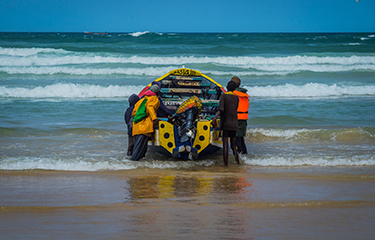New study estimates 100,000 fishing-related deaths occur annually

Research by the FISH Safety Foundation, commissioned by The Pew Charitable Trusts, found more than 100,000 fishing-related deaths occur annually, or the equivalent of around 300 fisher deaths per day.
The New Zealand-based FISH Safety Foundation is an independent non-profit "committed to providing relevant practical education, access to resources and promoting a positive safety culture in the global fishing industry." It said the study, "The Human Cost of Fishing," is "the most-complete analysis to date for the number of global fishing-related fatalities."
“It has been widely speculated that fisher mortality estimates have undercounted and hidden the danger of fishing," FSF Chief Executive Eric Holliday said. "Our analysis is the first of its kind and conclusively shows that a lack of transparency in the fishing industry endangers lives by obscuring the full picture of what occurs on vessels or at fishing grounds, making it difficult for governments to set effective policies to improve safety."
The report identifies dangerous working conditions and unsafe vessels as the leading factor of fisher deaths, but that the mortality figures are exacerbated by poverty, geopolitical conflict, overfishing, illegal, unreported, and unregulated (IUU) fishing, child labor, and climate change, which it said have a disproportionate impact on low-income fishers.
“While fishing can be inherently risky, the harsh reality is that many of these deaths were and are avoidable, Pew Charitable Trusts International Fisheries Project Director Peter Horn said. "With three billion people reliant on seafood and the demand expected to rise, stronger policies are urgently needed to keep fishers safe, including ones that address the true drivers of these deaths."
The study points to “IUU by necessity,” where industrial illegal operators ignore safety rules, cut corners, and overexploit highly profitable catch as forcing artisinal fishers to take part in unregulated, dangerous fishing activities. Changing distribution of fish stocks due to climate change has exacerbated that situation, FSF found.
“Fortunately, there are a number of tools available that can help stop industrial IUU and overfishing and improve safety concerns in one of the world’s most dangerous professions,” Horn said.
Based on the study, Pew recommends both domestic and international action to reduce the mortality rate of commercial fishing. At the domestic level, it called for implementation of more-robust fishing safety measures along with financial support and capacity-building to low-income communities. Internationally, Pew recommends improved data collection and transparency, as well as adoption of stronger safety measures.
Inaccurate data makes it difficult for necessary policy changes to be enacted at the local, state, and international level, Horn said.
“While not addressing all the issues, they clearly demonstrate intent to tackle this problem. International authorities must also prioritize counting these deaths. Only with a clearer picture of what is happening on the water can officials know when – and where – stronger action is needed. This study should be a clarion call to international authorities, national governments, and fisheries managers around the globe, to be accountable for addressing their piece of the problem. Fishers should no longer be dying in the dark, and governments can no longer ignore the severe human injustices and inequities resulting from insufficient action on IUU fishing, overfishing and climate change,” Horn said.
Pew recommended countries ratify existing regulatory frameworks that aim to protect fishers and stop illegal fishing, including he Cape Town Agreement, FAO Agreement on Port State Measures, and the 2007 ILO Work in Fishing Convention C188. Collectively, these treaties focus on safety standards for vessel construction and design, prevention of illegally caught fish from entering the supply chain, and specific standards of onboard living conditions.
Pew also called on regional fishery management organization member-states to push for clear policies on IUU fishing and overfishing.
Photo courtesy of Anze Furlan/Shutterstock






Share